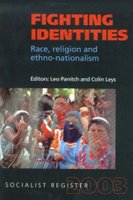Volcker's Report Reread: Business, not Corruption
Pratyush Chandra
The Report on Programme Manipulation (Volcker Report) brought out by the Independent Inquiry Committee (IIC) into the United Nations’ Oil-for-Food Programme provides a graphic account of how Saddam Hussein’s regime struggled to “launder” a meager sum of 1.8 billion dollars in the span of more than two years. The Report seeks to demonstrate how Iraq had to manipulate the sanction regime and play on various companies and agencies involved in the OFFP to obtain that amount.
I Saddam meant business!
The timing of the Volcker Report makes it an efficient tool for providing legitimacy to the American occupation and delegitimizing the UN’s ability to act as a multilateral world power opposed to the unilateralist US. Despite this, one may commend Volcker and his associates for describing Saddam Hussein’s scheme in such minute details. It seems that they used every real, half-real fact to complete this picture, putting many politicians and businessmen, who shook hands with Saddam Hussein when he was Iraq’s head-of-state, in the range of ‘suspicion’. However, a brief scrutiny shows that the whole exercise is an exposition of what every petty businessman does to survive in the world of competition, monopolies and surveillance. Of course, the Iraqi ruling elite and its “national” oil bourgeoisie had to be smarter as, on the one hand, the eyes of the competitors in the fellow oil economies and Western corporate oil companies were constantly watching the effect of Iraq’s primitive “in kind” oil sale on their own “in cash” transactions; while, on the other hand, any slack would have only hastened the execution of “what was already written” – the pending invasion by the US.
Iraq tried to make good use of its only privilege under the OFFP, choosing its oil buyers. The Volcker Report complains:
“Yet the decision to allow Iraq to choose its buyers empowered Iraq with economic and political leverage to advance its broader interest in overturning the sanctions regime. Iraq selected oil recipients in order to influence foreign policy and international public opinion in its favor. Several years into the Programme, Iraq realized that it could generate illicit income outside of the United Nations’ oversight by requiring its oil buyers to pay “surcharges” of generally between ten to thirty cents per barrel of oil.”
Only this privilege provided Iraq a degree of economic sovereignty, which other countries enjoyed more amply. And what it did with this privilege was nothing different from other countries. Every country requires a friendly international atmosphere to survive and grow, and it utilizes every means under its command to build it, and Iraq had only one way to mobilize “international public opinion in its favor” – by selecting oil recipients. Others, too, do have this privilege, but they have more than simply this.
The Volcker Report notes that Iraqis started by appeasing US companies, but found no effect on the US government’s attitude towards Iraq. So they had to approach other Security Council members to influence international bodies, like Russia and France. But this did not mean that the US companies didn’t gain by these arrangements. The report itself finds, “a substantial volume of oil under contract with Russian companies was purchased and financed by companies based in the United States and other countries.” So it was really, business as usual!
As far as “surcharges” are concerned, they were ‘illicit’ because Iraq was exceptionally segregated from involving itself in the ‘licit’ price war in which its competitors were engaged. And even the Bretton Woods institutions (WB/IMF) would admit it is not illegitimate to ‘curb’ the laws if they put hurdles in the ‘natural’ dynamics of market and capital. What Iraq did was nothing exceptional for a businessman facing a legal system adverse to his business interests. It was doing what was best for it in the face of UN induced ‘market imperfections’.
The other source of illicit income obtained by Iraq was “kickbacks paid by companies that it selected to receive contracts for humanitarian goods under the Programme”. The Volcker Report notes that here too “political considerations influenced Iraq’s selection of humanitarian vendors”. Interestingly, the Report itself accepts the legitimacy of this kickback policy by stating that it “began in mid-1999 from Iraq’s effort to recoup purported costs it incurred to transport goods to inland destinations after their arrival by sea at the Persian Gulf port of Umm Qasr”. However, the Report complains that Iraq could have sought approval from the United Nations for compensation of such costs, without noting that under normal circumstances any intermediation in such bilateral arrangements are abhorred. So why will Iraq like any other country or even business entity not covet sovereignty in its contractual engagements? Why will it allow UN surveillance in whatever it does? Why cannot it have its own business secrets? Why will it not engage in profiteering in the limited ‘market’ and opportunity that it is granted?
What Saddam Hussein’s Iraq and agencies dealing with it did were the only ‘rational’ business options before them under the exceptional regime of politico-economic sanctions. Its few loopholes were the only source of opportunities available for them, from which, even the Volcker Report admits, Iraq could not gain much except a few billion dollars. Whatever else it could acquire under the Oil-for-Food Programme was just enough to survive in destitution – food, medicines etc. The Programme was not meant for the reconstruction of the economy destroyed by bombs and isolation.
II Committee’s Unintended Conclusion
Less known is another report brought out by a Working Group instituted by Volcker’s Independent Inquiry Committee, The Impact of the Oil-for-food Programme on the Iraqi People (7 September 2005), which explicitly puts the very purpose of the OFFP as its main negative aspect:
“The short-term approach of the OFFP, essentially as a relief operation, led to many missed opportunities for greater impact, and indeed to some actual harm. A more effective humanitarian approach would have aimed to restore productive capacity, repair infrastructure, generate employment, and use the extensive capabilities of the Iraqi people to support their own livelihood. The basis for the “relief” approach was presumably at first the perceived urgency of the deteriorating situation – food had to be supplied – but the opportunity to move towards support to livelihood was not taken, for reasons such as the policy of reducing the Government of Iraq’s access to hard currency.”
The so-called “corruption” in the OFFP was fundamentally linked with the struggle over the “access to hard currency”. The UN and the hegemonic forces were hell bent upon enfeebling the Iraqi economy by making it cash-stricken; while Iraq was determined to utilize whatever limited opportunities the loopholes in the OFFP granted it. It even went on offensive by attempting to cut on dollar’s seigniorage by selling its oil in euro. (The Observer, 16 February 2003) Against all these, the OFFP’s realpolitik was rendered ineffective.
Hence, the dual purpose of the Programme was to allow the Iraqi population survive, while inciting them against the ‘intransigent’ regime of Saddam Hussein by providing opposed images of this intransigence against the “humanitarian” external forces. When the lingering sanctions and hardships seemed to homogenize the society furthermore making the possibility of any internal revolt very remote, and Iraq was able to “corrupt” the realpolitik of the Programme, the Security Council’s bosses began finding it obsolete. As the Report on the OFFP’s impact clearly states, the Programme as a “relief operation” was a marvelous success on almost every humanitarian account despite administrative problems and “corruption”. But this success could never be a reason for its continuance. Hence, the invasion took place.






0 Comments:
Post a Comment
<< Home